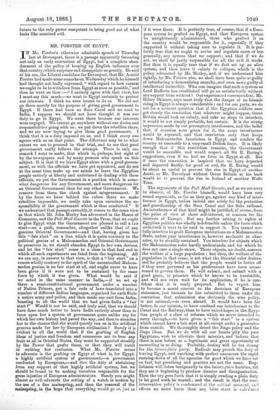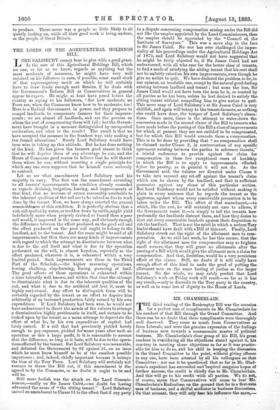MR. FORSTER ON EGYPT.
IN Mr. Forster's otherwise admirable speech of Thursday last at Devonport, there is a passage apparently favouring not only an early evacuation of Egypt, but a complete aban- donment of the policy of keeping up English influence over that country, which surprises and disappoints us greatly. He said of his son, the Liberal candidate for Devonport, that Mr. Arnold Forster had made some remarks on Wednesday which he himself had thought not badly expressed, " with regard to how earnest we ought to be to withdraw from Egypt as soon as possible," and then he went on thus :—" I entirely agree with that view, but I must say this much—we went to Egypt certainly to protect our interests. I think we were bound to do so. We did not go there merely for the purpose of giving good government to Egypt. If there had been no Suez Canal and no road to India, I suppose we should not have thought it was our duty to go to Egypt. We went there because our interests were engaged. We cannot go anywhere without our duties and responsibilities going with us ; we put down the rebellion there, and we are now trying to give them good government. I think that it is a duty imposed on us, and I think every one agrees with us on that point. The difference may be to what extent we are to proceed in that trial, and to see that good government really follows the attempt. There is only one remark I want to make, that which is, perhaps, lost sight of by the newspapers and by many persons who speak on this subject. It is that if we leave Egypt alone with a good govern- ment, or with the officials we have got appointed, and do not at the same time make up our minds to leave the Egyptian people entirely at liberty and unfettered in dealing with these officials, we put the Government in a position which is some- what dangerous for any Government, and more dangerous for an Oriental Government than for any other Government. We remove from them the check against misgovernment. If by the force we have behind the rulers there we make rebellion impossible, we really take upon ourselves the re- sponsibility of the government which is thus conducted." If we understand that passage correctly, it comes to the same view as that which Mr. John Morley has advocated in the House of Commons, and the Pall Mall Gazette in the Press, that we ought to give Egypt what the Government are pleased to call a fair start—on a path, remember, altogether unlike that of any genuine Oriental Government—and that, having given her this " fair start" on a line which it is quite contrary to the political genius of a Mahommedan and Oriental Government to persevere in, we should abandon Egypt to her own devices, and let the "fair start" come to a close in that foul end to which all such experiments are fated from the beginning. All we can say, in answer to that view, is that a "fair start" on a course wholly contrary to the spirit of the uncontrolled Mahom- medan genius, is no fair start at all, and ought never to have been given if it were not to be sustained by the same force by which it was given. What would be said if we acted in the same manner in India,—if we set up there a semi-constitutional government under a number of Native Princes, got a fair code of laws translated into a number of different Indian languages, organised for each State a native army and police, and then made our exit from India, boasting to all the world that we had given India a "fair start I" Would it not be said, and truly said, that we should have done much better to leave India entirely alone than to force upon her a system of government quite unlike any for which her own history had paved the way, and then to abandon her to the chance that she would quietly run on in the artificial grooves made for her by European civilisation ? Surely it is evident to all the world that if the grafting of English ideas of justice and freedom and commerce are to bear any fruit at all in Oriental States, they must be supported steadily by the Power that grafts them, or that they will result in nothing but confusion. iThat Mr. Forster seems to advocate is the grafting on Egypt of what is, for Egypt, a highly artificial system of _ government,—a government conducted by Europeans,—and then the duty of abstaining from any support of that highly artificial system, lest we should be found to be making ourselves responsible for the gross injustice of European administrators. Surely you might almost as well advocate the setting of a watch in motion by the use of a fine mainspring, and then the removal of the mainspring, in the hope that everything would go on just as if it were there. It is perfectly true, of course, that if a Euro- pean system be grafted on Egypt, and that European system be unrighteously administered, those who grafted it on the country would be responsible for it, especially if they supported it without taking care to regulate it. It is per- fectly true that we ought to revise and regulate more or less generally, any system that we support; and that if we do not, we shall be justly responsible for all the evil it works. But then it is equally true that if we first set up an alien system, and then leave it calmly to collapse, which is the policy advocated by Mr. Morley, and, if we understand him rightly, by Mr. Forster also, we shall have been quite as guilty of introducing a demoralising anarchy, and even more guilty of intellectual imbecility. Who can imagine that such a system as Lord Dufferin has established will go on satisfactorily without any support from without ? Our experienced correspondent, Mr. Hilary Skinner, says most truly that the danger of an Islamic rising in Egypt is always considerable ; and for our parts, we do not for a moment question that if the Egyptian soldiers once get clearly the conviction that whatever might happen, Great Britain would look on calmly, and take no steps to interfere, it would be not simply probable, but certain. It is the strong impression made by our peremptory interference, and the belief that, if occasion were given for it, the same interference would be repeated, and that conviction only that keeps down Mahommedan fanaticism in Egypt, and renders the country so amenable to a very small British force. It is likely enough that if this conviction remains, the Government would be amenable, and would respect all Sir E. Baring's suggestions, even if we had no force in Egypt at all. But if once the conviction is inspired that we have departed and departed finally, for good or evil, Sir E. Baring would be about as useful to prevent the rise in Egypt of another Arabi, as Mr. Trevelyan without Great Britain at his back would be to prevent the rise in Ireland of another Wolfe Tone.
The arguments of the Pall Mall Gazette, and as we are sorry to observe, of Mr. Forster himself, would have been very sound arguments, so far as they go, against any kind of inter- ference in Egypt, unless indeed one solely for the protection and guardianship of the Suez Canal and the Suez railroad. An interference of that kind might be justified, of course, from the point of view of sheer self-interest, or concern for the interests of Europe. But any further setting to rights of Egyptian politics was wholly indefensible unless the force which undertook it were to be used to support it. You cannot use- fully interfere to graft European institutions on a Mahommedan State, unless your interference is, however moderate in char- acter, to be steadily sustained. You interfere for objects which the Mahommedan ruler hardly understands, and for which he does not care a single straw. Those objects, no doubt, concern the welfare of a large population ; but then, the welfare of the population in that sense, is not what the Oriental ruler desires, and he probably believes that the people would be better off if they were governed as hits predecessors have been accus- tomed to govern them. He will submit, and submit with a good grace, to pressure which he knows to be irresistible, and will not even wait for its application, if he is con- fident that it is ready prepared. But to expect him to become a moral convert to the doctrines of European statesmen, just because he has submitted to them under the conviction that submission was obviously the wise policy, is not rational,—is even absurd. It would have been far better, in our opinion, to have confined our interference to the Canal and the Railway, than to have raised hopes in the Egyp- tian people of a class of reforms which we never intended to carry through,—to have given a " fair start" to a system which cannot have a fair start at all, except under a guarantee from outside. We thoroughly detest the Jingo policy and the Jingo ideas. But we do with all our hearts pity the poor Egyptians, wish to alleviate their miseries, and believe that there is now before us a legitimate and great opportunity of succeeding in so doing. Probably, destiny will be too strong for the laissez-faire party. Radicals may preach the duty of leaving Egypt, and watching with perfect unconcern the rapid running-down of all the agencies for good which we have set on foot, but preaching and practice are not the same. Eng- lishmen will listen benignantly to the laissez-faire doctrine, till they see it beginning to produce disaster and disorganisation. Then the cry goes forth that it is simply evading a plain duty to let good work be wasted ; and the result is that the non- intervention policy is condemned at the et itical moment, and effects no more harm than any false start is calcaated
to produce. There never was a people so little likely to sit quietly looking on, while all their good work is being undone, as the people of Great Britain.



































 Previous page
Previous page